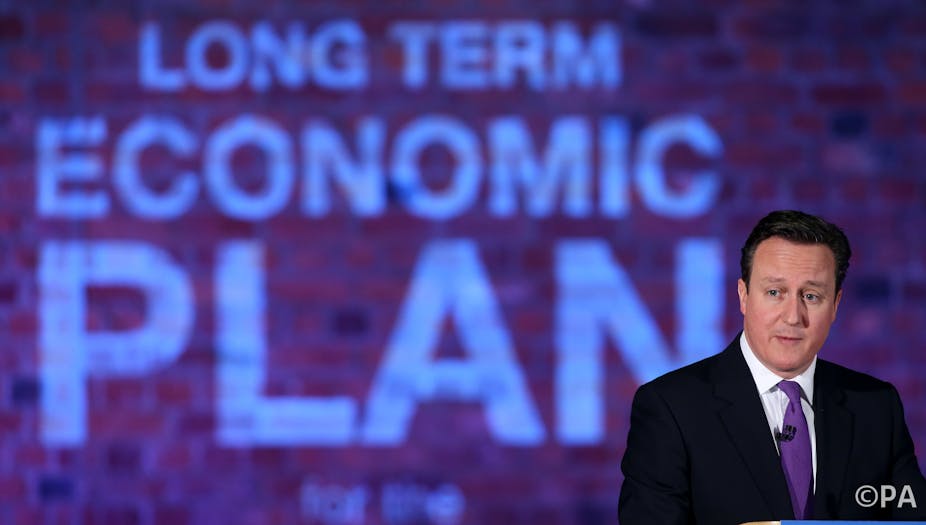In the first of a series of keynote speeches Prime Minister David Cameron identified the central theme of the Conservative Party’s 2015 general election manifesto: “to get Britain back to living within its means”.
In his speech, Cameron claimed that with other parties, voters will get “confusion”, “uncosted plans”, and “the spectre of more debt”. In contrast, Cameron promoted the Conservatives as “a strong and competent team”, with “a proven record” and “a long-term economic plan that is turning our country around”. While Cameron can certainly lay claim to a proven record, official statistics suggest that it is one of strategic failure.
The Conservatives’ plan for economic recovery is not built upon the spectre of more debt – it is built on the actuality of it. If given the chance to carry out these plans, I calculate that Cameron and Osborne will have added around £1.5 trillion of public and private debt to the national accounts by the end of a hypothetical second term.
This record of incompetence and profligacy with other people’s money offers no basis for an election campaign built on claims of competence in office and the threat of debt under rival political parties.
A strategic failure
In its 2010 budget, the Coalition promised that public sector net debt would peak at 70.3% of GDP in 2013-14, and fall back to 67.4% by 2015-16. Instead, the Coalition’s continued reliance on borrowing has seen public sector net debt reach £1.457 billion - or 79.5% of GDP - as of November 2014.
By that point, Osborne had added a further £494.9 billion to the national public debt. In his end of year update, the chancellor predicted that he would borrow £91.3 billion during the current financial year alone; that’s £54.3 billion more than his June 2010 prediction of only £37 billion.

The signature element of Osborne’s first five years has been his addition to public debt. The details accompanying his 2014 Autumn Statement reveal that, if re-elected, the signature element of his second term in office would be the addition of an even greater sum to the nation’s private debts.
Far from re-balancing the national economy towards a growth model built upon exports, private business investment and manufacturing, the plans agreed by Osborne, Cameron and Nick Clegg and Danny Alexander are set to add a further £883 billion to the nation’s private debts by the end of March 2020.
History repeats itself
On July 9, 1976, a major party leader addressed the Midlands town of Solihull, laying out a nine-point plan for industrial recovery, and issuing a stark warning to an audience of industrialists. “The recovery and expansion of British industry is the most important single task of the next government. On that, everything else depends.” The speaker chillingly concluded: “We must export or die … we must manufacture, or die even quicker.’
That speech was given by Margaret Thatcher, whose government’s policies led to the loss of more than two million manufacturing jobs and countless established firms. It is the fault of that government and its successors that this country has been unable to arrest the calamitous decline of its manufacturing industry. As a result, the electorate must now face up to the prospect of stagnant or falling real living standards as the new normal.
Throughout the whole parliamentary term at Westminster, including the current election campaign, the two front benches have fixated on the UK’s budget deficit and the scale of public debt. Very little, if any, attention has been paid to the UK’s other deficits; namely, those upon its current account, its trade with the rest of the world, and its international investment position.
Every government has delivered annual deficits on the UK’s current account since 1984, and on its trade account since 1982. In the three months to November 2014, the UK recorded its largest ever trade in goods deficit with Germany, to the tune of £7.8 billion.
Just before Christmas, the ONS reported that the deficit on the UK’s current account – the balance of its trade with and income from the rest of the world – had risen to £27 billion from £24.3 billion in the previous quarter.
To finance that deficit, the country has squandered its North Sea oil revenue, sold off its privatised utilities to foreign ownership and engaged in a fire sale of national public and private assets. This has meant that by the end of 2012, no less than 53.4% of UK quoted shares were owned by overseas investors.
The Coalition’s greatest strategic failure, which it shares with every United Kingdom government since the mid-1970s, has been the demise of its plans to re-balance the economy. As I have argued elsewhere, successive governments have repeatedly failed to move away from an over-dependence upon financial services and a debt-led, consumer-driven, import-fuelled growth model, towards one based upon private sector investment, manufacturing, and exports.
The unpalatable fact – to which none of the major British political parties will own up during the forthcoming general election campaign – is that for the past forty years, under successive Conservative, Labour and coalition governments, the UK economy has failed to live with its means.

